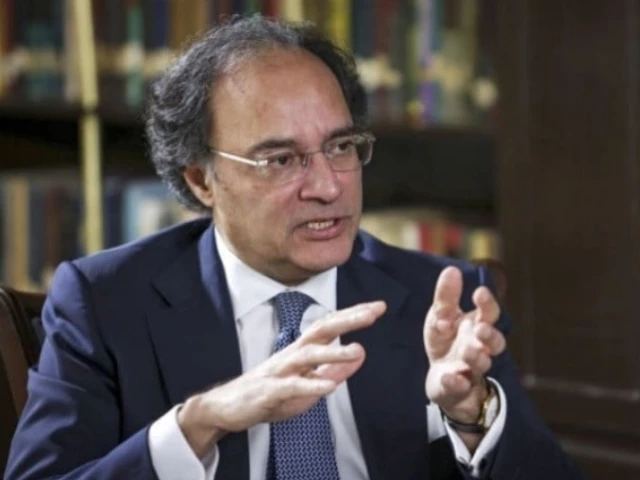SBP working on exchange, interest rates for stability: FinMin
Three major rating agencies are positive about Pakistan

Finance Minister Muhammad Aurangzeb has stated that the State Bank of Pakistan is working on the exchange rate and interest rate, and the situation is expected to improve further.
The federal finance minister inaugurated the Job and Education Expo at the Expo Centre, Karachi, organised by the Pakistan Hindu Council. At the expo, around 120 stalls were set up by various institutions and companies for students.
Speaking to the media, Aurangzeb expressed gratitude to the organisers, saying that he had the opportunity to meet the country’s future leadership here. He noted that both public and private institutions were present at the job fair, but the absence of the corporate sector was felt.
He said that technology is the path to the future. Youth should work with their hearts and minds, and always strive for excellence.
Speaking about the Independence Day celebration of the “Marka-e-Haq,” the finance minister said that followers of all religions in the country commemorated it with great spirit.
Read: PM pushes for cashless, digital economy
He added that the corporate sector needs to step forward. Interest rate should not be made the single-point agenda.
In order to promote working capital, Pakistan must look beyond banks and include capital markets as well. He emphasised that the debt capital market also needs to be shifted to the Pakistan Stock Exchange mechanism for greater efficiency.
Aurangzeb highlighted that the circular debt in the power sector is declining, with three distribution companies (DISCOs) set to be privatised soon. He added that the government is also working to resolve circular debt in the gas sector, which has long been a burden on the economy.
On monetary policy, the minister clarified that the government has no role in setting interest rates, as this falls under the mandate of the State Bank of Pakistan. He said the exchange rate would continue to be determined by the market. Pakistan already has funding available, he noted, and the challenge now is to put those resources to effective use.
He praised Mustafa Kamal’s efforts in population control and underlined the importance of women’s economic participation, saying it could be a key driver in eradicating poverty. Aurangzeb confirmed that discussions with the World Bank regarding funding to support such initiatives have already taken place.
The finance minister said the IMF’s review mission would soon arrive in Pakistan under the ongoing 37-month programme, adding that the government remains in constant contact with the Fund. Looking ahead, he expressed optimism that by 2047 Pakistan’s economic situation would be that of a developed nation.
Aurangzeb also pointed to Pakistan’s strong anti–money laundering laws, which he said had enabled the country’s removal from the FATF grey list. He expressed confidence that Pakistan would remain off the list going forward.
Speaking on the recent rainfall damage in Khyber Pakhtunkhwa, he said his immediate priority was helping and rehabilitating affected people, while it was still too early to estimate the scale of losses.
When asked about traders’ demand for a new province, the finance minister refrained from giving a direct response.
There is no button for growth; the real thinking should be about sustainable growth. The role of the government is to provide an enabling environment. Public-private partnerships are working successfully. We are moving toward the AI world, and there is no room for doubt that we must move forward.
The finance minister said that ups and downs keep coming, but talent remains unaffected. Economic stability has now been achieved in the country.
The three major rating agencies are positive about Pakistan. The State Bank is working on the exchange rate and interest rate, and as stability increases, the situation will improve further.





1724319076-0/Untitled-design-(5)1724319076-0-208x130.webp)















COMMENTS (1)
Comments are moderated and generally will be posted if they are on-topic and not abusive.
For more information, please see our Comments FAQ